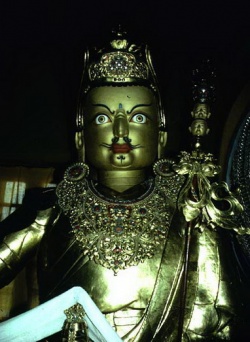Martial arts: Certificate mills
A mill is a operation that churns out an endless supply of a product. A certificate mill churns out an endless supply of phony education degrees or rank certificates to anyone who pays a fee. Check out the Accreditation topic for infomation on education mills.
Mills are a touchy subject! Mills do not like being classified as mills since it would interfere with their fraudulent income. Willing or unwilling victims of mills do not like their degrees, certifications, ranks, etc. being exposed as useless, since they rely upon them for self-gratification. and sometimes their jobs.
Rank certificate mills
Some organizations exist only to issue rank certificates to those who send them money. Most require little to no verification of claims of rank and they do not attempt to authenticate the claims; you just send them money and they send you an "official" certificate.
Mills do not test in person, they do everything through correspondence, the applicant's physical presence is not required nor desired. One reason being they do not want you to see what the organization really is; a computer system in the bedroom of an apartment. Before everyone gets upset, not all organizations that issue rank through correspondence are mills. Some do everything they can to authenticate applicant claims. However, none of this would be necessary if they simply required the applicant to test in person at an organization official testing.
Some of things mills use for verification of claimed rank:
- Resume. Some of mills require you to send a resume of your martial arts history. This is easily faked, look at all the fake and inflated job resumes.
- Copy of your rank certificates. Easily created and printed on a home computer or obtained from another online mill. Since the person is submitting a copy, it makes it impossible to tell if it fake by looking at it. Unless the organization knows the issuer to be legitimate and is able to verify that the issuer actually issued the certificate, it is worthless.
- Thesis. This is usually just a paper. A thesis is an academic project that is researched and written in accordance with academic standards, constantly reviewed and critiqued during its formation, and then submitted and defended in person before an academic board. A paper is just a writing submitted by a person. We all know from our school and college days that papers have never been faked, right?
- Tournament history. Easily faked or inflated unless the organization has direct access to tournament records or knows trustworthy people who were at the tournaments who can verify the information.
- Letters of recommendation. Easily faked unless they are from people within the organization or from people to whom the organization has direct contact.
- Video of person performing. Easily faked by having a stand in perform in the video. Some organizations may require a copy of a photo ID to verify the person on the video; however, photo ID's are easily faked, especially when you are only furnishing a copy. At a test, the testee has one chance to get it right or he or she fails; not matter how tired, ill. or injured the person may be at the time. On video, the testee chooses the best time to perform and can make numerous versions and select only the best one to submit.
Mills do not authenticate claims made by applicants since any attempt to do so would be cost prohibitive; therefore, they just rely on their infinite wisdom to discern whether the claims are true. The requirements are just there to make the process seem legitimate, they are actually just a part of the scam.
Some organizations may actually have good intentions, strict standards, and try to authenticate all claims; however, authentication can be very expensive. If an applicant is willing to spend all the money required to have his or her claims authenticated, why do they not just pay the money to get tested in person.
What should be considered for rank?
Every time I awarded a rank to a student, I asked myself, would I want this student to be an example of a student of mine at this rank level. When a martial artist says he or she was awarded his or her rank by me, it means my integrity and teaching abilities will be judged by what that martial artist is able to do. As do most instructors, when I tested a student for rank, the student had to perform techniques, stances, patterns, breaks, sparring self-defense sequences, etc. I compared reach student's performance to:
What would be considered a perfect performance.
- The level of performance expected of a student testing for this rank.
- The level of performance as compared to students who had tested for the rank in the past.
- The level of performance as compared to other students who were testing for the rank at that moment.
I could not accomplish this through correspondence. I want to see the student’s, appearance, mannerisms, body structure, etc., and how he or he reacts to stress, failure, pain, etc. I want to feel the strength of the student's handshake and test his or her muscle tone. I want to smell the cleanliness of the testee and his or her uniform, and hear the student's breathing, the depth of the kiais, and the moans and groans. Rank testing is an experience, not an administrative process.
A legitimate rank issuing organization issues rank to students who have been:
- Trained by a certified instructor of the organization.
- Tested in person by a certified instructor, or a group of certified instructors, of the organization. A 5th degree in karate disagreed with the contention that all rank should only be issued to people who have tested "in person," as has been done since the inception of the martial arts. His complaint being that today most organizations issue high rank by correspondence (previous rank certificates, resume, letters of recommendation, thesis, videos of performance, tournament records, etc.) and that ranks above 3rd degree are mostly awarded for time in rank and work in the art and the organization, not physical performance. His argument is that correspondence rank is just as legitimate as rank issued to people who tested in person. This is good news for 1st, 2nd, and 3rd degrees. To get rank now, you have to bust ass, but if this is true, after you make 3rd degree, all you will to do to get rank is—kiss ass.
- Recommended for rank by a certified instructor, or a group of instructors, of the organization as having met or exceeded the organizations requirements for the rank.
If a person has rank that was issued by his or her martial art's certifying organization, why would they want to pay more money for a rank certificate from some "unifying" organization or have their rank "recognized" by another organization? They would not! However, there are some who would:
- People without legitimate rank.
- People seeking more justification for their illegitimate rank.
- People who think their importance is determined by the number of rank certificates they have on the wall.
- Founders and sokes of martial arts who seek recognition for their new arts so they may show potential students that they are legitimate masters of their martial art.
- Sometimes there may be legitimate reason to have your rank recognized by an organization, such as the Amateur Athletic Union (AAU), so you may compete in their tournaments, or the World Taekwondo Federation (WTF) so you may compete in the Olympics.
So, why do certificate mills exist? To make money! They charge tens, if not hundreds, of dollars for a 25-cent certificate that is only worth the paper upon which it is printed. Just as no legitimate university will accept course credits or degrees earned from illegitimate or unaccredited schools, no legitimate martial art organizations will accept rank obtained from a mill.
What mills "say" they do
- Unify the martial arts. I guess this means that if all martial artists are recognized by one group then the martial arts are unified. I think not.
- Permit people without access to their masters or their organizations to get promoted. If the master is active, find him or her and do what it takes to get the rank. If the master is dead or inactive, find the next in line. If you deserve rank, they will be active enough in your organization to earn the rank.
- Permit people who have broken away from their masters to get promoted. People who have broken away from their masters or organizations have to bear the consequences of their actions. Most form their own art or organization and give themselves rank. They use mills to get more rank in an effort to add credence to their self-imposed rank.
- Permit people who are not physically able to test anymore to get rank. Life is not fair. At some point, every person becomes unable to do some of the things he or she used to do. Deal with it, do not expect special treatment because of it.
- Verify rank claims. Yea, right! Even if they wanted to verify rank, it is not economically possible. Verification by having people fill out forms, sent in copies of rank certificates, sent in recommendations, send in videos, etc. is all a waste of time since all of these may be easily forged by a teenager on the family computer. Checking with each organization to see if they in fact issued the rank and then checking to see if the organization itself is not fake takes a lot of time and money. Even though the cost of the rank application is exorbitant and a rip-off in itself, it is not nearly enough to cover the cost of any detailed verification. Some organizations claim their board of "experts" has the ability to recognize fake credentials. Counterfeit money fools banks, but "masters" have the ability to spot counterfeit rank. Another one of their extraordinary skills?
- Stay out of the "politics" of the martial arts. It is easy to stay out of something you are not in. When you are not connected to any legitimate organization, there are no politics to avoid. The only thing to avoid is the law.
- Do not pass judgment on the legitimacy of martial arts. Therefore, they will recognize anything that says it is a martial art, after they receive the money of course.
- Do not criticize other martial arts. Of course they do not criticize, if they did, they would not MAKE MONEY! When others criticize them for ripping-off the public, they say it is not in the spirit of the martial arts for others to be criticizing them. They think this "holier than thou" attitude makes them immune from criticism.
Military background
From surfing the web for certificate mills, I have noticed that many of the mills are operated by current military, prior military, or retired military "masters." Many also claim PhD's from martial art organizations or from unaccredited online "universities." Why do so many of them have military backgrounds, I do not know; but it is certainly an embarrassment to other martial artists who are in or who have served in the military. It may be because their claimed military background is as fake as everything else.
Be careful
Be careful with dealing with certificate mills. They are spiteful people who get very nasty when you question their tactics or their credentials. They will not provide you with answers or facts, they will only attack you for questioning their integrity. They are very protective of their money making operations.




